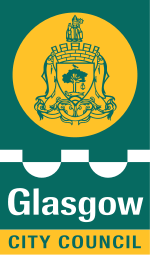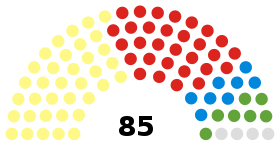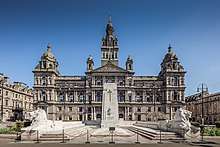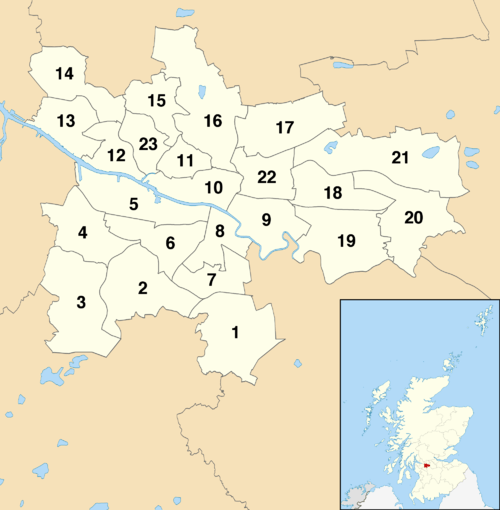Glasgow City Council
Glasgow City Council is the local government authority for the City of Glasgow, Scotland. It was created in 1996 under the Local Government etc. (Scotland) Act 1994, largely with the boundaries of the post-1975 City of Glasgow district of the Strathclyde region.
Glasgow City Council | |
|---|---|
| Full council election every 4 years | |
 Coat of arms | |
 Glasgow City Council logo | |
| Type | |
| Type | |
| History | |
| Preceded by | Glasgow District Council |
| Leadership | |
Cllr Philip Braat, Labour since 23 January 2020 | |
Leader of the Council | |
Chief executive | Annemarie O'Donnell since 12 November 2014 |
| Structure | |
| Seats | 85 |
 | |
Political groups |
|
| Elections | |
| Single transferable vote | |
Last election | 5 May 2017 |
Next election | 5 May 2022[2] |
| Motto | |
| Let Glasgow Flourish | |
| Meeting place | |
 | |
| Glasgow City Chambers | |
| Website | |
| www | |
History
The early city, a sub-regional capital of the old Lanarkshire county, was run by the old "Glasgow Town Council" based at the Tollbooth, Glasgow Cross.[3] In 1895, the Town Council became "The Corporation of the City of Glasgow" ("Glasgow Corporation" or "City Corporation"), around the same time as its headquarters moved to the newly built Glasgow City Chambers in George Square.[4]
It retained this title until local government re-organisation in 1975, when it became the "City of Glasgow District Council", a second-tier body under Strathclyde Regional Council which was also headquartered in Glasgow. Created under the Local Government (Scotland) Act 1973, it included the former county of the city of Glasgow and a number of areas previously within the county of Lanark: Cambuslang (Central and North, and South lying outwith East Kilbride), Rutherglen (including the burgh of Rutherglen), part of a Carmunnock area (that lying outwith East Kilbride) and Baillieston, Carmyle, Garrowhill, Mount Vernon and Springboig.[5][6][7]
The city council established in 1996 (Local Government etc. (Scotland) Act 1994) was one of the newly created single-tier local authorities, taking on the powers and responsibilities previously divided between the City of Glasgow District and Strathclyde Region bodies, which were abolished, and with boundaries somewhat different from those of the former: the Cambuslang, Halfway, Rutherglen and Fernhill areas (four wards) were transferred from the city area to the new South Lanarkshire council area.
Council structure
The council is ceremonially headed by the Lord Provost of Glasgow, who is elected to convene the council and perform associated tasks as a general civic leader and Lord Lieutenant; the role has history dating from the 15th century. The current Lord Provost, elected in January 2020, is Philip Braat[8][9] with previous incumbent Eva Bolander (in post from May 2017 to October 2019)[10] having resigned following criticism of her personal 'civic allowance' spending.[11]
The council's executive branch is headed by a Leader of the Council, who is the leader of the largest political grouping, currently the Scottish National Party. The executive committee is usually formed of 19 members across all the elected parties proportionally, however this would have given the SNP a majority of 10 seats despite not gaining one through the election. The Greens proposed an amendment to add an additional seat for each party, making the SNP the biggest minority party.[12] It was passed and so its composition of 23 seats is currently:[13]
| Affiliation | Councillors | |
| Scottish National Party | 11 | |
| Scottish Labour | 8 | |
| Scottish Conservative | 2 | |
| Scottish Greens | 2 | |
History of leaders and administrations
- For previous leaders, see Politics of Glasgow#History of leaders and administrations
| Controlling party | Years | Leader | ||
|---|---|---|---|---|
| Labour | 1980–2017 | |||
| 1996–1997: Bob Gould (Labour) | ||||
| 1997–1999: Frank McAveety (Labour) | ||||
| 1999–2005: Charlie Gordon (Labour) | ||||
| 2005–2010: Steven Purcell (Labour) | ||||
| 2010–2015: Gordon Matheson (Labour) | ||||
| 2015–2017: Frank McAveety (Labour) | ||||
| No overall control | 2017–present | 2017–present: Susan Aitken (SNP) | ||
Elections
The council consists of 85 councillors elected for a five-year term from 23 wards. These wards were introduced for the 2017 election, replacing those introduced in 2007, and each returns three or four members by the single transferable vote system of election. This system was introduced by the Local Governance (Scotland) Act 2004,[14] as a means of ensuring a reasonably proportionately representative outcome.
The most recent full council election took place on Thursday 4 May 2017. The Scottish National Party became the largest party (39) but did not gain an overall majority; Labour returned fewer councillors (31) and lost overall control, with increased numbers for the Conservatives (8) and the Greens (7).
Previous elections
Since creation of Glasgow City Council
- 1995 Glasgow City Council election:[15]
- 83 members elected (FTTP): 77 Labour; 3 Conservative; 1 SNP; 1 Liberal Democrat; 1 Scottish Militant Labour
- 1999 Glasgow City Council election:[16]
- 79 members elected (FTTP): 74 Labour; 2 SNP; 1 Conservative; 1 Liberal Democrat; 1 Scottish Socialist
- 2003 Glasgow City Council election:[17]
- 79 members elected (FTTP): 71 Labour; 3 SNP; 3 Liberal Democrat; 1 Conservative; 1 Scottish Socialist
- 2007 Glasgow City Council election:[18]
- 79 members elected (STV): 45 Labour; 22 SNP; 5 Liberal Democrat; 5 Scottish Green; 1 Conservative; 1 Solidarity
- 2012 Glasgow City Council election:[19]
- 79 members elected (STV): 44 Labour; 27 SNP; 5 Scottish Green; 1 Conservative; 1 Liberal Democrat; 1 Glasgow First
Current multi-member ward system
For previous ward compositions, see Wards of Glasgow#Previous ward systems

A new multi-member ward system was introduced for the 2017 council election:
Ward notes
- Carmunnock, Castlemilk, Cathcart (part), Croftfoot, King's Park (part), Muirend, Simshill
- Arden, Auldhouse, Carnwadric, Cowglen, Eastwood, Hillpark, Kennishead, Mansewood, Merrylee, Newlands, Pollokshaws
- Crookston (part), Darnley, Deaconsbank, Hurlet, Nitshill, Parkhouse, Pollok (part), Priesthill, Southpark
- Cardonald, Corkerhill, Crookston (part), Hillington, Mosspark, Penilee, Pollok (part)
- Cessnock, Drumoyne, Govan, Ibrox, Kinning Park, Shieldhall, Tradeston
- Bellahouston, Craigton, Dumbreck, Pollokshields, Port Eglinton, Shawlands (part), Strathbungo
- Battlefield, Cathcart (part), Langside, King's Park (part), Mount Florida, Shawlands (part), Toryglen
- Crosshill, Gorbals, Queen's Park, Govanhill, Hutchesontown, Oatlands
- Barrowfield, Bridgeton, Calton, Dalmarnock, Gallowgate, Newbank, Parkhead (part)
- Anderston, Charing Cross, Cowcaddens, Finnieston, Garnethill, Glasgow City Centre, Kelvingrove, Kelvinhaugh, Merchant City, Townhead, Yorkhill
- Hillhead, Kelvinbridge, North Kelvinside, Park District, St George's Cross, Woodlands, Woodside
- Anniesland (part), Broomhill, Glasgow Harbour, Jordanhill, Thornwood, Whiteinch
- Garscadden, Knightswood (part), Scotstounhill, Scotstoun, Yoker
- Anniesland (part), Blairdardie, Drumchapel, Knightswood (part), Old Drumchapel, Temple
- Gilshochill, Maryhill, Summerston, Wyndford
- Cadder, Colston, Hamiltonhill, Milton, Lambhill, Parkhouse, Port Dundas, Possilpark, Ruchill
- Balornock, Barmulloch, Millerston (part), Robroyston, Springburn
- Barlanark, Cranhill, Carntyne, Greenfield Riddrie, Springboig
- Braidfauld, Carmyle, Lilybank, Mount Vernon, Parkhead (part), Sandyhills, Shettleston, Tollcross
- Baillieston, Broomhouse, Easthall, Garrowhill, Swinton, Wellhouse
- Blackhill, Craigend, Easterhouse, Garthamlock, Hogganfield, Ruchazie
- Dennistoun, Germiston, Haghill, Royston, Sighthill
- Dowanhill, Hyndland, Kelvindale, Kelvinside, Partick (part)
Footnotes
- "SNP will run Glasgow Council as minority". 18 May 2017 – via www.bbc.co.uk.
- King, Hannah. "Upcoming elections". www.edinburgh.gov.uk.
- Trongate, 1770 (Mitchell Library, Foulis Academy Prints), The Glasgow Story
- City Chambers (Mitchell Library, Glasgow Collection), The Glasgow Story
- "New Local Government areas". Hansard. 22 October 1973. Retrieved 4 November 2018.
- Irene Maver. "Modern Times: 1950s to The Present Day > Neighbourhoods". The Glasgow Story. Retrieved 4 November 2018.
- "Scotland's Landscape: City of Glasgow". BBC. Retrieved 4 November 2018.
- New Lord Provost elected to Glasgow City Council, BBC News, 23 January 2020
- Everything you need to know about Glasgow's new Lord Provost Philip Braat, Glasgow Live, 23 January 2020
- "Glasgow's new Lord Provost is revealed". Evening Times.
- Glasgow Lord Provost Eva Bolander resigns after expenses row, BBC News, 31 October 2019
- "Garscadden/Scotstounhill councillor to oversee all city schools as new minority SNP council takes charge". Clydebank Post. Retrieved 20 May 2017.
- "Glasgow City Council on Twitter". Twitter. Glasgow City Council. Retrieved 18 May 2017.
- See also Local Governance (Scotland) Act 2004, Office of Public Sector Information (OPSI) website
- Scottish Council Elections 1995 - Results and Statistics, H.M. Bochel, D.T. Denver, p.95-97
- Scottish Council Elections 1999 - Results and Statistics, H.M. Bochel, D.T. Denver
- Chapter 57 Clyde Councils, Local Election Results, 5th May 2003, Andrew Teale
- Local Election Results 3rd May 2007, Andrew Teale (2008)
- Local Election Results 2012: Glasgow, Local Elections Archive Project (LEAP), Andrew Teale
- "Local Ward Factsheets". Glasgow City Council. 1 January 2017. Retrieved 6 July 2018.
| Awards and achievements | ||
|---|---|---|
| Preceded by Durham |
LGC Council of the Year 2015 |
Succeeded by Tameside Metropolitan |